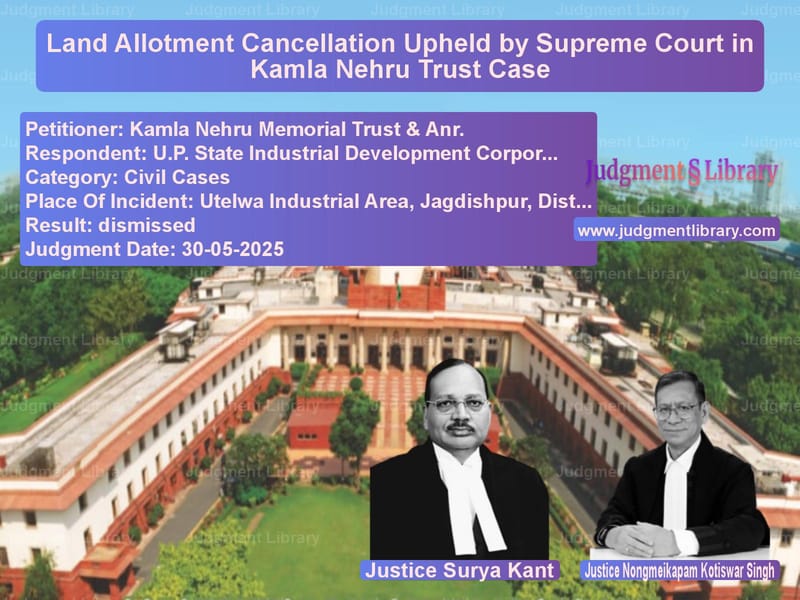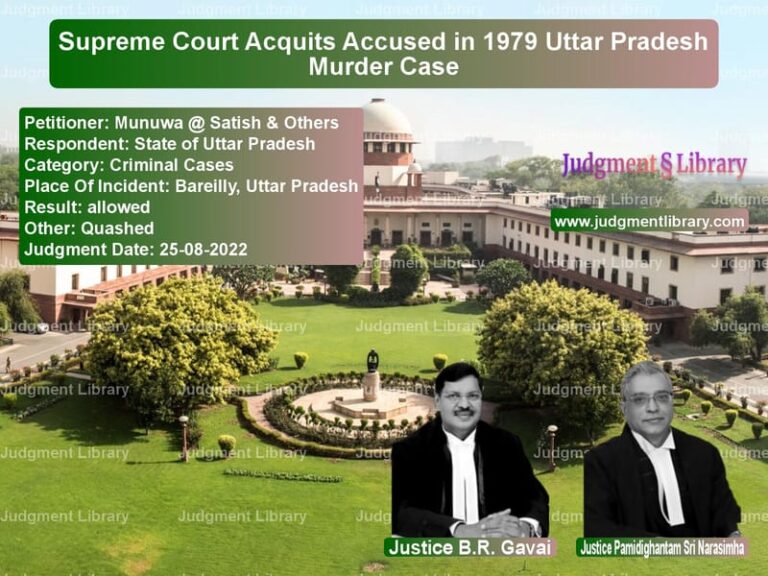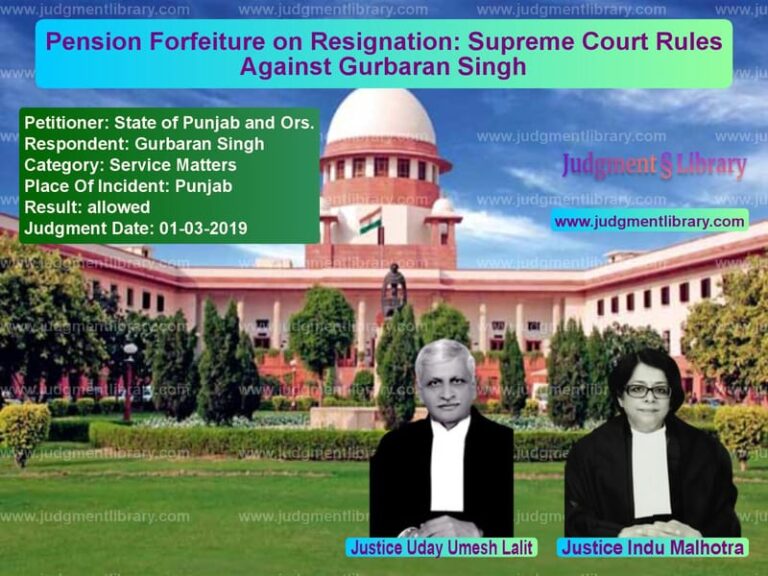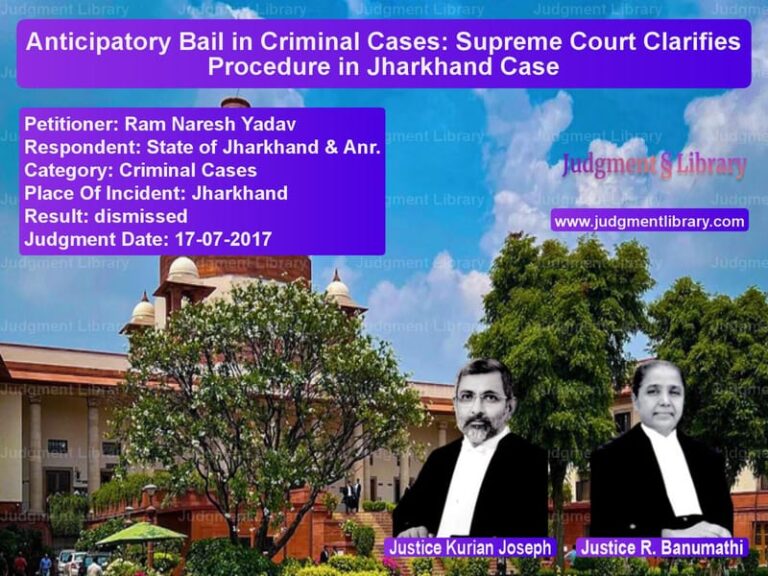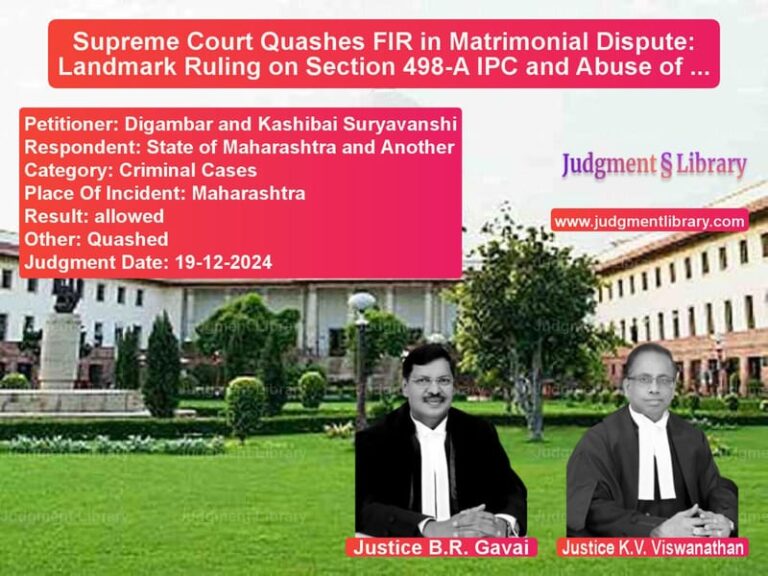Land Allotment Cancellation Upheld by Supreme Court in Kamla Nehru Trust Case
In a landmark judgment that underscores the importance of procedural compliance and the public trust doctrine in allocation of state resources, the Supreme Court recently delivered its verdict in a long-standing dispute over 125 acres of industrial land in Uttar Pradesh. The case pitted the Kamla Nehru Memorial Trust against the Uttar Pradesh State Industrial Development Corporation, spanning over 15 years of litigation and raising fundamental questions about how public resources should be allocated and managed.
The story begins in 2003 when the Kamla Nehru Memorial Trust, a charitable trust established in 1975, decided to venture into floriculture. In July 2003, the trust applied for allotment of 125 acres of land in the Utelwa Industrial Area, Jagdishpur, District Sultanpur, Uttar Pradesh. What followed was an unusually swift allotment process – within just two months of application, UPSIDC issued the allotment letter on September 18, 2003. The allotment came with specific conditions, including payment schedules and deadlines that would become the central point of contention in the years to follow.
The initial terms required KNMT to deposit reservation money by October 18, 2003, with the remaining 90% of the provisional premium to be paid in eight equal half-yearly installments starting from January 1, 2006. The allotment letter clearly stated that failure to make payments as stipulated would result in automatic cancellation and forfeiture of earnest money. This clause would prove prophetic as the trust almost immediately defaulted on the very first payment deadline.
What followed was a series of extensions, rescheduling, and repeated defaults that stretched over six years. UPSIDC showed considerable patience, granting multiple extensions and even rescheduling the payment plan in 2005, allowing KNMT to pay the total amount of approximately 1.44 crore rupees in ten installments over five years. Despite these concessions, the trust continued to default on payments while simultaneously raising issues about demarcation, encroachment, and possession of the land.
The situation came to a head in November 2006 when UPSIDC issued a final notice demanding payment of approximately 68.49 lakh rupees and submission of necessary documents for execution of the lease deed within ten days. When KNMT failed to comply, instead repeating its request for possession without making payments, UPSIDC cancelled the allotment in January 2007. This cancellation triggered a legal battle that would wind its way through the Allahabad High Court and eventually reach the Supreme Court.
The Legal Battle and Arguments Presented
Before the Supreme Court, senior counsel Mr. Maninder Singh, representing KNMT, presented several key arguments challenging the cancellation. He contended that the High Court erred in concluding that KNMT failed to make payments as per schedule, arguing instead that UPSIDC had failed to transfer physical possession of the land and had frustrated the contract by not fulfilling its reciprocal obligations. The counsel emphasized that KNMT had written several letters requesting delivery of possession, but UPSIDC continued to make excuses and used outstanding dues as a pretext for not handing over possession.
Mr. Singh further argued that UPSIDC’s refusal to demarcate the land contravened the allotment letter provisions. He stated that UPSIDC was not in a position to handover physical possession as farmers were still holding the land and cultivating it for agricultural purposes. The counsel also pointed out that following the High Court’s directions in 2009, KNMT had duly deposited the due amount with UPSIDC, which had remained unutilized for over ten years, demonstrating the trust’s compliance with both the allotment terms and court directions.
Perhaps the strongest legal argument advanced by KNMT concerned procedural irregularities in the cancellation process. The counsel argued that the High Court erroneously interpreted Clause 3.04(vii) of the UPSIDC Manual, which stipulates that UPSIDC must give three legal notices to defaulters. In this case, UPSIDC had sent only one such notice dated November 13, 2006. Therefore, the cancellation suffered from procedural infirmities and was legally untenable as it disregarded both the mandatory notice requirements and the fundamental principle of reciprocal contractual obligations.
On the other side, senior counsels Mr. K.K. Venugopal and Mr. Atmaram N.S. Nadkarni, representing UPSIDC, presented a compelling counter-narrative. They argued that UPSIDC had provided ample opportunities for KNMT to make payments as per the allotment terms, but the trust had chosen to delay payment for over six years on false and misleading grounds. Even after UPSIDC took a lenient view and rescheduled payment terms, KNMT failed to honor its commitments. The counsel emphasized that despite the High Court’s directions in 2007, KNMT paid only the outstanding principal amount without any interest or additional fees for restoration.
The UPSIDC counsel maintained that the procedure outlined in the Manual had been duly adhered to through notices dated December 14, 2004, July 1, 2005, December 14, 2005, and November 13, 2006. They characterized KNMT’s repeated requests for interest waiver as a strategy to avoid payment obligations rather than genuine attempts to resolve the issue. Regarding the demarcation and encroachment allegations, the counsel asserted these were false and vexatious, pointing out that the allotment letter itself contained the site plan with precise measurements, and UPSIDC had demarcated the land to KNMT’s satisfaction in March 2005, which the trust had acknowledged in its letter dated March 11, 2005.
The Supreme Court’s Analysis and Reasoning
The Supreme Court bench comprising Justices Surya Kant and Nongmeikapam Kotiswar Singh conducted a thorough examination of the factual matrix and legal arguments. The court framed two central issues: whether UPSIDC was responsible for frustrating the performance of the allotment contract, and whether the cancellation of allotment was procedurally defective and legally untenable.
On the first issue regarding contract frustration, the court systematically dismantled KNMT’s arguments. Examining the demarcation issue, the court found that although KNMT had addressed multiple communications to UPSIDC alleging non-demarcation, these were ex-facie an afterthought. The court noted that the site plan appended with the allotment letter described precise measurements and all relevant details. More importantly, the court highlighted that UPSIDC had demarcated the land on March 3, 2005, to KNMT’s satisfaction, and the trust had acknowledged this fact in its letter dated March 11, 2005, which stated: “It is to inform that the demarcation of the said land has been made on 03.03.2005 by the department, which I agree. Please inform the value of the stamp papers required for the execution of the registry of the said land, so that I may get the lease deed of the said land executed, so that further work may be proceeded.”
Regarding the encroachment allegations, the court accepted UPSIDC’s affidavits enumerating details of the 276 Khasra numbers constituting the land, supported by documentary proof that possession had been duly taken after completing the acquisition process, including payment of compensation to landowners. The court found the encroachment allegations devoid of merit.
On the crucial issue of possession, the court examined Clause 2.15 of the Manual, which deals with delivery of possession of plots. The court noted that this clause explicitly provides that “the date of Possession of Plots shall be fixed by the Regional Manager after registration of Lease Deed itself.” The court observed that this created a sequential condition where registration must precede possession. Therefore, UPSIDC’s insistence on furnishing requisite documents for registration of the lease deed was both legitimate and in conformity with prescribed procedure. Since KNMT failed to furnish necessary documents timely, it was itself to blame for non-delivery of possession.
The court concluded its analysis on the first issue by stating: “Our examination of all three contentions raised by KNMT reveals that none of the alleged acts—non-demarcation, removal of encroachment, or non-delivery of possession—constitute conduct that would frustrate the performance of the allotment terms. On the contrary, the record demonstrates that UPSIDC acted in accordance with prescribed procedures and as per the terms of allotment. In contrast, KNMT failed to fulfil its obligations, particularly regarding the timely submission of documents required for executing the lease deed. The foundation upon which KNMT forges its argument of frustration thus crumbles.”
On the second issue regarding procedural defects in cancellation, the court conducted a detailed analysis of Clause 3.04 of the Manual, which prescribes the procedure for addressing defaults by allottees. KNMT had placed considerable emphasis on sub-clause (vii), contending that UPSIDC failed to issue three consecutive legal notices as mandated. While KNMT conceded that the notice dated November 13, 2006 could be considered a legal notice, it argued that previous correspondence didn’t meet the threshold.
The court approached this issue through the prism of administrative law principles vis-à-vis contractual powers of the State. While acknowledging that land allotment authorities possess inherent right to cancel allotments upon violation of conditions, the court emphasized that judicial intervention should ensure adherence to procedural safeguards. The court then defined the essential characteristics of a legal notice within the Manual’s contemplation, stating that it should contain clear facts conveying relevant circumstances, intimation of impending legal obligation or breach, intention to hold the other party liable for legal action, and must be unambiguous without misleading or suppressing material information.
Applying these criteria, the court found that communications dated December 14, 2004, December 14, 2005, and November 13, 2006 constituted valid legal notices, thus satisfying the three-notice requirement. The court observed: “If the communications dated 14.12.2004, 14.12.2005, and 13.11.2006 are juxtaposed to the abovementioned ingredients, we have no reason to doubt that these constitute valid ‘legal notices’ and thus, UPSIDC has duly complied with the process envisaged under Clause 3.04(vii) of the Manual.”
The court further noted that dues for the land allotted in 2003 remained unpaid despite multiple communications spanning several years, establishing KNMT as a chronic defaulter. The court characterized KNMT’s persistent attempts to seek concessions as a deliberate strategy to avoid payment obligations, making UPSIDC’s action both justified and necessary to preserve allotment process integrity.
The Public Trust Doctrine and Systemic Concerns
In what may be the most significant aspect of the judgment, the Supreme Court invoked the Public Trust Doctrine to address broader systemic concerns in public resource allocation. The court noted that the prolonged litigation spanning fifteen years had unnecessarily burdened the judicial system and impeded efficient functioning of public authorities. While upholding the cancellation due to KNMT’s default, the court expressed concern about the original allocation process, where UPSIDC allotted the land within merely two months of application, raising questions about evaluation thoroughness.
The court elaborated on the Public Trust Doctrine, noting that it emanates from the ancient principle that certain resources are so intrinsically important to the public that they cannot be subjected to unrestricted private control. In the Indian context, the Doctrine has evolved to encompass public resources meant for collective benefit, reflecting the constitutional mandate under Article 21. The court observed that while the Doctrine doesn’t impose absolute prohibition on transferring public trust property, it subjects such alienation to stringent judicial review to ensure legitimate public purpose and adequate safeguards.
The court made a significant observation about the allocation process: “The allocation of 125 acres of industrial land to KNMT without a competitive process fundamentally violated the Doctrine, which demands proper procedure and substantive accountability in public resource allocation. UPSIDC ought to have considered verifiable evidence of economic benefits, employment generation potential, environmental sustainability, and alignment with regional development objectives to demonstrate that the decision serves the collective benefit. The failure to adopt transparent mechanisms not only deprived the public exchequer of potential revenue—as evidenced by the substantial appreciation in the value of such a large tract of land—but also created a system where privileged access supersedes equal opportunity. This betrays the fiduciary relationship between the State and its citizens.”
Conclusion and Directions
In its final ruling, the Supreme Court upheld the cancellation of allotment by UPSIDC, dismissing KNMT’s appeals. However, in a significant move, the court also declared any allotment or offer made by UPSIDC in favor of M/s Jagdishpur Paper Mills Ltd for the same land as illegal and contrary to public policy, consequently annulling it. The court directed refund of any payments received from the prospective allottee along with bank interest.
Most importantly, the court issued directions for future allocations, ordering the State Government of Uttar Pradesh and UPSIDC to ensure that any such allotment be made in a transparent, non-discriminatory, and fair manner that fetches maximum revenue and achieves larger public interest like industrial development priorities, environmental sustainability, and regional economic objectives. The court specifically directed that the subject land shall be allotted strictly in accordance with this procedure.
This judgment represents a significant reinforcement of accountability principles in public resource management. While upholding the cancellation based on contractual defaults, the court used the opportunity to establish broader principles for transparent and equitable allocation of state resources, ensuring that public trust is maintained in the administration of valuable government assets. The invocation of the Public Trust Doctrine sets an important precedent for future cases involving allocation of public land and resources, emphasizing that the state must act as a prudent trustee rather than a arbitrary benefactor when dealing with public assets.
Petitioner Name: Kamla Nehru Memorial Trust & Anr..Respondent Name: U.P. State Industrial Development Corporation Limited & Ors..Judgment By: Justice Surya Kant, Justice Nongmeikapam Kotiswar Singh.Place Of Incident: Utelwa Industrial Area, Jagdishpur, District Sultanpur, Uttar Pradesh.Judgment Date: 30-05-2025.Result: dismissed.
Don’t miss out on the full details! Download the complete judgment in PDF format below and gain valuable insights instantly!
Download Judgment: kamla-nehru-memorial-vs-u.p.-state-industria-supreme-court-of-india-judgment-dated-30-05-2025.pdf
Directly Download Judgment: Directly download this Judgment
See all petitions in Property Disputes
See all petitions in Contract Disputes
See all petitions in Landlord-Tenant Disputes
See all petitions in Specific Performance
See all petitions in Damages and Compensation
See all petitions in Judgment by Surya Kant
See all petitions in Judgment by N. Kotiswar Singh
See all petitions in dismissed
See all petitions in supreme court of India judgments May 2025
See all petitions in 2025 judgments
See all posts in Civil Cases Category
See all allowed petitions in Civil Cases Category
See all Dismissed petitions in Civil Cases Category
See all partially allowed petitions in Civil Cases Category

